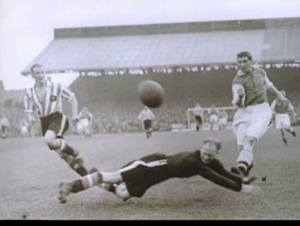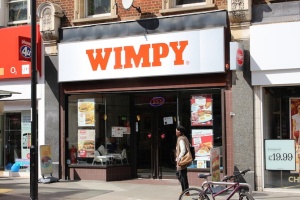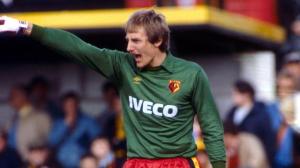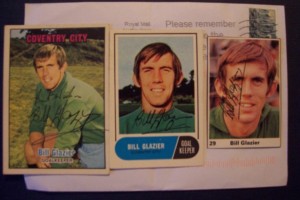 Today we will conclude our review of all the Brentford goalkeepers from the past forty-five years, and we pick up the story in 2008/09 with loanee Ben Hamer firmly in possession of the position. His backup was Seb Brown, a self-admitted AFC Wimbledon fan who played once for us in the Johnstone’s Paint Trophy and saved a penalty in a shootout victory over Yeovil before signing for his favourite team where his two penalty shootout saves against Luton helped them gain entry into the Football League. Young Lloyd Anderson also had his moment in the sun when he came on to replace Hamer when he was stupidly sent off at Barrow and he conceded two goals for his trouble before finally ending up as perhaps the only other Brentford player since Keith Hooker to play for both Brentford and Brentwood Town. Mikkel Andersen was another one-game-wonder, as one Reading loan goalkeeper replaced another when Hamer was suspended. Mikkel could not have chosen a more exciting game to play in and he really looked the part too in our last gasp victory over Bradford City in which he was named Man of the Match. Not a bad way to mark your only appearance for the club. Mikkel is still only twenty-six and was stuck on Reading’s bench when we played them last Saturday, but I fully expect that he will eventually make his breakthrough and become an established top level goalkeeper.
Today we will conclude our review of all the Brentford goalkeepers from the past forty-five years, and we pick up the story in 2008/09 with loanee Ben Hamer firmly in possession of the position. His backup was Seb Brown, a self-admitted AFC Wimbledon fan who played once for us in the Johnstone’s Paint Trophy and saved a penalty in a shootout victory over Yeovil before signing for his favourite team where his two penalty shootout saves against Luton helped them gain entry into the Football League. Young Lloyd Anderson also had his moment in the sun when he came on to replace Hamer when he was stupidly sent off at Barrow and he conceded two goals for his trouble before finally ending up as perhaps the only other Brentford player since Keith Hooker to play for both Brentford and Brentwood Town. Mikkel Andersen was another one-game-wonder, as one Reading loan goalkeeper replaced another when Hamer was suspended. Mikkel could not have chosen a more exciting game to play in and he really looked the part too in our last gasp victory over Bradford City in which he was named Man of the Match. Not a bad way to mark your only appearance for the club. Mikkel is still only twenty-six and was stuck on Reading’s bench when we played them last Saturday, but I fully expect that he will eventually make his breakthrough and become an established top level goalkeeper.
With Hamer returning to his parent club, newly promoted Brentford were on the lookout for a new goalkeeper and they ended up playing four of them throughout the 2009/10 season. Andy Scott was apparently offered Everton’s John Ruddy on a season-long loan but changed his mind at the last moment and signed Derby County’s Welsh International keeper, Lewis Price instead. This was not one of the best decisions that he ever made given how well Ruddy has subsequently progressed and Price’s inconsistency. Lewis did made a phenomenal last minute save from Morgan Schneiderlin to earn us a meritorious point at Southampton, but, looking far smaller and frailer than his claimed height of six foot three inches, he never really convinced and conceded a bizarre last minute equaliser at home to Millwall from a forty-yard free kick from way out on the left wing which precipitated his replacement, but more of that anon.
The Bees also made the surprise signing of Aldershot’s Nicky Bull who, after being their undisputed first choice for many years, had decided to retire but quickly changed his mind and joined Brentford as back-up keeper instead. He spent a frustrating year largely kicking his heels after suffering a back injury but his rare appearances saw him go from the ridiculous to the sublime when firstly he dozily stepped over his own goal line whilst still holding onto Simon Francis’s seemingly innocuous long-range free kick against Southend before saving a penalty kick at Leyton Orient. Bull was soon forgotten when Scott then totally redeemed himself by making perhaps the most inspired signing of his managerial career in young Arsenal starlet Wojciech Szczęsny.
Not yet twenty years of age but already a full international for Poland, he saved a penalty kick in his second match and it was immediately obvious that we had a star on our hands. He remained on loan until the end of the season, conceded just over a goal per game and his incredible all-round ability and sheer force of personality shone through. He put on goalkeeping masterclasses game after game and some of the saves he made against Norwich, Leeds, Carlisle and Bristol Rovers in particular beggared belief. Have a look on Youtube if you doubt me and I guarantee that you will be as astounded as I was. His ability was merely confirmed by the general bemusement amongst Bees supporters when he had a rare off day and played appallingly against MK Dons and was totally responsible for two soft goals, but as the old saying goes – “the defects of great men are the consolation of the dunces.” He received the ultimate accolade of receiving a fully deserved standing ovation from the home supporters when he was withdrawn for Simon Moore to make a brief debut just prior to the final whistle of the last game of the season so that he could milk their applause. We will not see his like again as he was precociously brilliant and light years ahead of anyone else we had watched at Griffin Park, in my memory at least.
 How do you replace such an icon? Well Andy Scott seemed to have hit the jackpot when he brought in experienced Watford keeper Richard Lee, but he made a disastrous start and was rusty and unimpressive in his first two preseason appearances. Scott handled the situation poorly and instead of giving Lee, a keeper of proven ability and pedigree, the opportunity to settle in to the role, he immediately banished him to the bench and gave young Simon Moore a brief chance before bafflingly auditioning two more loan keepers who further muddied the water. Alex McCarthy was yet another Reading goalkeeper who followed the well-trodden path to Griffin Park but he was soon on his way back after a tentative and stuttering loan spell which saw six goals fly past him in only three games. McCarthy has subsequently proved himself at Premier League level but he was distinctly below average for us.
How do you replace such an icon? Well Andy Scott seemed to have hit the jackpot when he brought in experienced Watford keeper Richard Lee, but he made a disastrous start and was rusty and unimpressive in his first two preseason appearances. Scott handled the situation poorly and instead of giving Lee, a keeper of proven ability and pedigree, the opportunity to settle in to the role, he immediately banished him to the bench and gave young Simon Moore a brief chance before bafflingly auditioning two more loan keepers who further muddied the water. Alex McCarthy was yet another Reading goalkeeper who followed the well-trodden path to Griffin Park but he was soon on his way back after a tentative and stuttering loan spell which saw six goals fly past him in only three games. McCarthy has subsequently proved himself at Premier League level but he was distinctly below average for us.
Like a bad penny, Ben Hamer was soon back for his third loan spell at Brentford replacing his own teammate Alex McCarthy. Again he did nothing wrong but by this time the Bees had embarked upon successful runs in both the Carling Cup and Johnstone’s Paint Trophy and Richard Lee seized his chance to establish himself as our “Cup Keeper” with some phenomenal performances. He impressed in a narrow win over Hull City before earning his spurs with a superlative match-winning performance against Premier League giants Everton. Lee made save after save to help keep us afloat before becoming an instant hero when saving Jermaine Beckford’s effort in the penalty shootout. Our Carling Cup run came to a cruel halt with a shootout defeat at Birmingham in the next round but it was in the Johnstone’s Paint Trophy where Lee came into his own as the Bees won three penalty shootouts in a row against Orient, Swindon and Charlton on their way to a Wembley final appearance. I have written previously about Richard’s Three Card Trick against Charlton when he emulated Graham Benstead’s feat against Wrexham and made three consecutive, and indeed, outrageous penalty saves. Not surprisingly Lee soon took over in league matches too from the blameless Hamer who had become surplus to requirements. As if fate had not intervened enough, Lee’s roller coaster season ended with him being named as Player of the Year but also missing out on a place at Wembley when he dislocated his shoulder making a brave save against Orient.
Poor Richard never had much luck with injuries and eventually his recurring shoulder problems forced him out of the reckoning far too early and for good, and this enabled firstly Simon Moore and then David Button to establish themselves in the first team. He has remained in the background in a supporting role and as an overall good influence and will retire at the end of the season after a long and distinguished career that never quite rose to the heights that his undoubted ability suggested. Given his popularity and affability we will gloss over his recent short-term and career-ending loan at Fulham! His business nous and intelligence will surely provide him with a fulfilling and successful post-football career.
Goalkeeping Coach Simon Royce, a man who had already enjoyed an excellent career, deputised for Lee when he was sent off and subsequently suspended and clearly demonstrated in his brief appearances that it was time for him to pack up for good and concentrate on teaching rather than doing. Trevor Carson, a loanee from Sunderland, also made a brief cameo appearance at Sheffield Wednesday and was never seen again.
Simon Moore fought his way up from being an unheralded trialist from the Isle of Wight and, aided by Lee’s injury battles, he became first choice and quickly demonstrated his exceptional ability. Unspectacular, calm and competent he made few mistakes and picked crosses out of the air with consummate ease. Having secured his reputation as one of the brightest talents outside the top flight, he joined Premier League Cardiff City on the eve of the 2013/14 campaign for a substantial fee but his career has unfortunately stymied as he has so far been unable to displace David Marshall.
Unknown Frenchman Antoine Gounet emulated Gus Hurdle by walking unannounced into the training ground and earning himself a contract. He was small, agile and unorthodox and finally earned his opportunity when helping the Bees to an FA Cup replay victory over Bradford City before fading out of contention.
That leads us to the present day, and our excellent current pairing of David Button and Jack Bonham about both of whom I have already written extensively. We have been blessed with some exceptional goalkeepers over the past four decades or so and whilst comparisons are invidious, if pushed, my top ten in terms of a combination of talent and overall popularity would be as follows:
- Chic Brodie
- Steve Sherwood
- Len Bond
- Dave McKellar
- Graham Benstead
- Paul Smith
- Wojciech Szczęsny
- Richard Lee
- Simon Moore
- David Button
Please let me know if your verdict differs from mine, as I am sure that it will.























